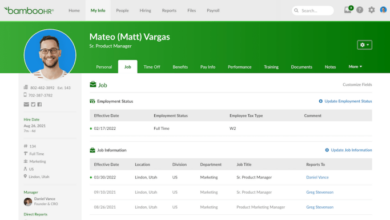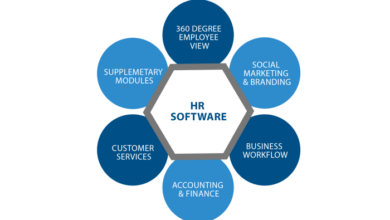
Paycom Competitors and Alternatives: Finding the Right Fit
Paycom competitors and alternatives are taking center stage in the HR and payroll software market. As businesses increasingly seek efficient and cost-effective solutions, the landscape is becoming crowded with options. Whether you’re a small startup or a large enterprise, navigating this diverse field can feel overwhelming.
This guide aims to help you understand the key players, their strengths and weaknesses, and ultimately, find the solution that best meets your unique needs.
From established industry giants like ADP and Workday to niche players specializing in specific sectors, there’s a plethora of solutions vying for your attention. But how do you know which one is right for you? We’ll delve into the features, pricing, and customer support of each, providing a comprehensive comparison that helps you make an informed decision.
Paycom Overview
Paycom is a leading provider of comprehensive human capital management (HCM) solutions, designed to streamline and automate various HR processes for businesses of all sizes. The company offers a cloud-based platform that integrates multiple HR functions, including payroll, benefits administration, talent acquisition, employee onboarding, and performance management.
Paycom’s target audience is primarily small and medium-sized businesses (SMBs) seeking a comprehensive and user-friendly HCM solution to manage their workforce efficiently. The platform is designed to simplify complex HR tasks, reduce administrative burdens, and improve employee engagement.
Paycom’s Strengths
Paycom’s strengths lie in its comprehensive suite of features, user-friendly interface, and focus on customer satisfaction. Here are some of the key features and benefits:
- Comprehensive HCM Solution:Paycom offers a unified platform that integrates various HR functions, eliminating the need for multiple disparate systems. This streamlines processes, reduces data silos, and provides a holistic view of the workforce.
- User-Friendly Interface:Paycom’s platform is designed with simplicity and ease of use in mind. Its intuitive interface makes it easy for both HR professionals and employees to navigate and utilize the system effectively.
- Mobile Accessibility:Paycom offers mobile apps for both employees and managers, allowing them to access key HR functionalities anytime, anywhere. This enhances flexibility and convenience for employees and improves communication within the organization.
- Robust Reporting and Analytics:Paycom provides comprehensive reporting and analytics tools that enable businesses to track key HR metrics, identify trends, and make data-driven decisions. This empowers organizations to optimize their workforce and improve overall efficiency.
- Excellent Customer Support:Paycom is known for its exceptional customer support. The company offers dedicated account managers and 24/7 technical support, ensuring that businesses receive timely assistance and resolve any issues promptly.
Paycom’s Market Positioning
Paycom occupies a strong position in the HCM market, particularly for SMBs. Its comprehensive functionality, user-friendly interface, and commitment to customer satisfaction have made it a popular choice for businesses looking to streamline their HR operations. Paycom’s competitive advantages include:
- All-in-One Solution:Paycom’s integrated platform eliminates the need for multiple point solutions, simplifying HR management and reducing costs.
- Focus on SMBs:Paycom’s platform is specifically tailored to meet the needs of SMBs, offering features and pricing options that are appropriate for their size and budget.
- Strong Customer Focus:Paycom prioritizes customer satisfaction and provides excellent support, ensuring that businesses have a positive experience with the platform.
Key Competitors: Paycom Competitors And Alternatives

Paycom faces stiff competition in the HR and payroll software market from several established players. These competitors offer a wide range of features and cater to different business sizes and industries. Understanding the competitive landscape is crucial for businesses considering Paycom and its alternatives.
Key Paycom Competitors, Paycom competitors and alternatives
Paycom’s primary competitors include:
- ADP (Automatic Data Processing): A leading provider of HR and payroll solutions, ADP offers a comprehensive suite of products for businesses of all sizes. They are known for their robust payroll processing capabilities, talent management tools, and extensive global reach.
- Paychex: Another major player in the HR and payroll market, Paychex provides a similar range of services to ADP, focusing on small and medium-sized businesses. They are known for their user-friendly interface and competitive pricing.
- Workday: A cloud-based HR and financial management platform, Workday offers a comprehensive suite of solutions for large enterprises. They are known for their advanced analytics capabilities and focus on talent management.
- Ultimate Software (Ultimate Kronos Group): Ultimate Software, now part of Ultimate Kronos Group (UKG), provides a cloud-based HR and payroll platform with a focus on employee engagement and talent management. They are known for their innovative features and strong customer support.
- Gusto: A popular choice for startups and small businesses, Gusto offers a streamlined payroll and HR platform with a focus on ease of use and affordability. They are known for their excellent customer service and integration with other business tools.
When exploring Paycom competitors and alternatives, it’s essential to understand the different software categories involved. Do you need a dedicated payroll solution, or are you looking for a comprehensive Human Resources Information System (HRIS) that integrates payroll with other functions like talent management, benefits administration, and time tracking?
This is where understanding the distinctions between payroll software vs HRIS vs ERP vs HCM becomes crucial. By aligning your needs with the specific capabilities of each software type, you can effectively evaluate Paycom competitors and choose the best solution for your organization.
Comparison of Key Features
Paycom and its competitors offer a wide range of features, each with its own strengths and weaknesses. The following table compares Paycom with its primary competitors based on key features:
| Feature | Paycom | ADP | Paychex | Workday | Ultimate Software (UKG) | Gusto |
|---|---|---|---|---|---|---|
| Payroll Processing | Yes | Yes | Yes | Yes | Yes | Yes |
| HR Management | Yes | Yes | Yes | Yes | Yes | Yes |
| Time and Attendance Tracking | Yes | Yes | Yes | Yes | Yes | Yes |
| Benefits Administration | Yes | Yes | Yes | Yes | Yes | Yes |
| Recruiting and Onboarding | Yes | Yes | Yes | Yes | Yes | Yes |
| Performance Management | Yes | Yes | Yes | Yes | Yes | Yes |
| Talent Management | Yes | Yes | Yes | Yes | Yes | Yes |
| Analytics and Reporting | Yes | Yes | Yes | Yes | Yes | Yes |
| Mobile Access | Yes | Yes | Yes | Yes | Yes | Yes |
| Integration with Other Systems | Yes | Yes | Yes | Yes | Yes | Yes |
Pricing Comparison
Pricing for HR and payroll software varies significantly based on the number of employees, features included, and other factors. The following table provides a general overview of pricing for Paycom and its competitors:
| Company | Pricing Model | Typical Monthly Cost per Employee |
|---|---|---|
| Paycom | Per-employee pricing | $30-$50 |
| ADP | Per-employee pricing | $25-$45 |
| Paychex | Per-employee pricing | $20-$40 |
| Workday | Per-employee pricing | $40-$60 |
| Ultimate Software (UKG) | Per-employee pricing | $35-$55 |
| Gusto | Per-employee pricing | $39-$60 |
Customer Support Comparison
Customer support is an essential factor to consider when choosing an HR and payroll software provider. The following table compares Paycom and its competitors based on customer support:
| Company | Customer Support Channels | Availability | Reputation |
|---|---|---|---|
| Paycom | Phone, email, live chat | 24/7 | Good |
| ADP | Phone, email, live chat | 24/7 | Excellent |
| Paychex | Phone, email, live chat | 24/7 | Good |
| Workday | Phone, email, online support portal | 24/7 | Excellent |
| Ultimate Software (UKG) | Phone, email, live chat | 24/7 | Excellent |
| Gusto | Phone, email, live chat | 24/7 | Excellent |
Alternative Solutions
While Paycom is a popular choice for payroll and HR management, it might not be the best fit for every business. Depending on your company’s size, industry, and specific needs, alternative solutions can offer more specialized features and better value.
Choosing the right payroll software can be a real headache, especially with so many Paycom competitors and alternatives out there. It’s all about finding the right fit for your needs, and sometimes, that means getting creative! If you’re looking for a fun and easy way to add some personality to your office space, try a felt leaf wall decor DIY project.
It’s a great way to boost morale and create a more inviting environment, which can be just as important as choosing the right payroll software.
Specialized Software
Specialized software caters to specific industries or functions, providing deeper functionality and integration with existing systems.
Finding the right HR software can feel like searching for the perfect dress – you want something that fits your needs and looks good. Just like you might be browsing the latest Lisa Tan x Coast dresses at Debenhams for a special occasion, you’ll want to consider the features and functionality of different HR software solutions.
When it comes to Paycom competitors, there are plenty of options out there, so don’t be afraid to shop around and find the perfect fit for your company.
- Construction:Software like Procore and Viewpoint focus on project management, time tracking, and compliance for construction companies.
- Healthcare:Solutions like Athenahealth and Kareo streamline billing, scheduling, and patient communication for healthcare providers.
- Non-profit:Platforms like Bloomerang and NeonCRM are designed for managing donor relationships, fundraising, and event planning for non-profit organizations.
These solutions offer advantages like:
- Industry-specific features:They provide tools and features tailored to the unique needs of specific industries, improving efficiency and compliance.
- Integration with existing systems:Seamless integration with other industry-specific software reduces data duplication and improves data accuracy.
- Specialized support:Experts in the relevant industry provide better support and guidance, addressing specific challenges and ensuring compliance.
However, these solutions may have limitations:
- Limited functionality:They may not offer a comprehensive suite of HR and payroll features, requiring additional software or manual processes.
- Higher costs:Specialized software often comes with higher subscription fees compared to general-purpose solutions.
- Steeper learning curve:The complexity of specialized features might require more time and effort to learn and master.
Businesses with unique needs and industry-specific requirements might benefit from these solutions. For example, a construction company with complex project management needs and a large workforce would find specialized construction software more advantageous than a general-purpose solution like Paycom.
Niche Players
Niche players offer targeted solutions for specific aspects of payroll and HR management, providing deeper functionality and customization options.
- Time and attendance:Solutions like TimeClock Plus and Deputy focus on time tracking, scheduling, and attendance management.
- Applicant tracking:Platforms like Greenhouse and Lever specialize in recruiting and managing job applications.
- Benefits administration:Software like Zenefits and Gusto handle benefits enrollment, administration, and compliance.
These solutions offer advantages like:
- Deep functionality:They offer advanced features and customization options for specific areas of HR and payroll management.
- Integration with existing systems:They can be integrated with other HR and payroll software, creating a more comprehensive solution.
- Cost-effectiveness:They provide specialized functionality at a lower cost compared to comprehensive solutions.
However, these solutions may have limitations:
- Limited scope:They may not cover all aspects of payroll and HR management, requiring additional software or manual processes.
- Integration challenges:Integrating with other software can be complex and time-consuming.
- Limited support:Niche players may have smaller support teams, resulting in slower response times and limited expertise.
Businesses with specific needs and a desire for deeper functionality in specific areas might benefit from these solutions. For example, a company with a high volume of job applications and a complex recruiting process would find an applicant tracking system more advantageous than a general-purpose solution like Paycom.
Factors to Consider
Choosing the right payroll and HR software is a crucial decision for any business. While Paycom is a popular option, it’s essential to consider other factors and alternatives to ensure you select the best solution for your specific needs. This involves a comprehensive evaluation of various aspects, ensuring a perfect fit for your company’s unique requirements.
Industry-Specific Features and Compliance Requirements
Different industries have distinct payroll and HR needs. For example, construction companies may require specialized features for tracking time and attendance, while healthcare organizations need to comply with HIPAA regulations. It’s essential to choose a solution that caters to your industry’s unique requirements and ensures compliance with relevant laws and regulations.
Choosing a solution that aligns with your industry’s specific needs and regulatory requirements is paramount for efficient operations and compliance.
Scalability, Integration Capabilities, and Customer Support
As your business grows, your payroll and HR software should be able to scale with you. Consider the software’s ability to handle increasing employee numbers, data volume, and complex processes. Integration with other business systems, such as accounting software and CRM, is crucial for streamlining operations and avoiding data silos.
- Scalability:The software should be able to handle your company’s growth in terms of employees, data volume, and complexity of processes.
- Integration Capabilities:The software should seamlessly integrate with other systems you use, such as accounting software, CRM, and applicant tracking systems.
- Customer Support:Responsive and reliable customer support is essential for addressing any issues and ensuring smooth operation.
Case Studies

Real-world examples of businesses using Paycom and its alternatives can offer valuable insights into their effectiveness and the challenges they address. Examining these case studies can help you understand the potential benefits and drawbacks of these solutions and determine if they align with your specific business needs.
Paycom Implementation at a Mid-Sized Manufacturing Company
This case study explores the experience of a mid-sized manufacturing company that implemented Paycom’s comprehensive HR and payroll system. The company, with approximately 500 employees, sought to streamline its HR processes, improve employee engagement, and reduce administrative overhead.
- Challenges:The company faced challenges with manual processes, outdated technology, and fragmented systems. They struggled with time-consuming tasks, such as payroll processing, employee onboarding, and benefits administration.
- Benefits:Implementing Paycom helped automate many of these processes, reducing manual effort and errors. The company experienced a significant reduction in payroll processing time, improved employee self-service capabilities, and a centralized platform for managing HR data.
- Factors Contributing to Success:The company’s success was attributed to careful planning, comprehensive training, and strong leadership support. They involved key stakeholders throughout the implementation process, ensuring buy-in from employees and management.
Alternative Solution: ADP Workforce Now at a Retail Chain
This case study focuses on a large retail chain that implemented ADP Workforce Now, an alternative to Paycom, for its HR and payroll needs. The company, with over 10,000 employees across multiple locations, aimed to enhance employee engagement, improve compliance, and gain real-time insights into its workforce.
- Challenges:The company faced challenges with managing a geographically dispersed workforce, ensuring compliance with complex labor laws, and gaining visibility into employee performance and engagement.
- Benefits:ADP Workforce Now provided a centralized platform for managing employee data, automating payroll and benefits administration, and providing real-time reporting and analytics. The company experienced improved compliance, enhanced employee engagement, and better decision-making based on workforce data.
- Factors Contributing to Success:The company’s success was attributed to its strong commitment to technology adoption, comprehensive training programs, and a dedicated team to support the implementation. They also leveraged ADP’s expertise in compliance and workforce management.






